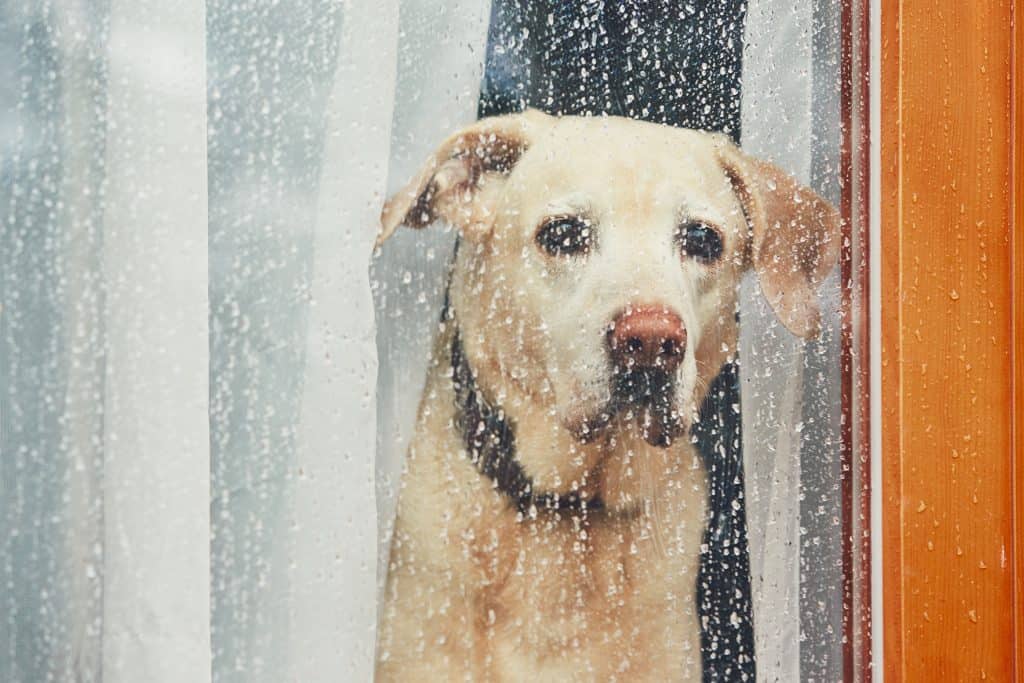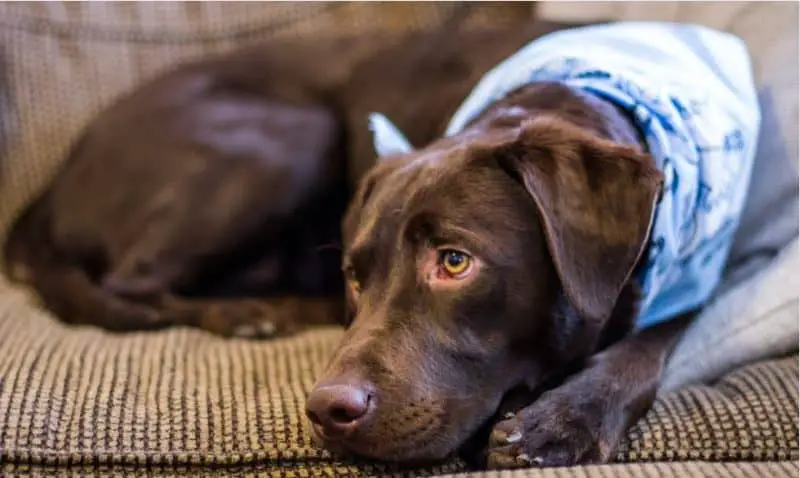
Separation anxiety is a common affliction in dogs. We have domesticated these animals to be loyal companions that will show love and affection unconditionally. So, it is no surprise that these devoted dogs can suffer if left alone for too long. They may think that they have done something wrong or that you abandoned them. Separation anxiety in Labradors can be a big issue if you don’t control this behavior from the beginning. The best place to begin is to learn more about the condition, its symptoms, and the ways that you can help your dog to overcome separation anxiety.

Why do dogs suffer from separation anxiety?
Some breeds, such as Labrador Retrievers, are more likely to develop separation anxiety because of their temperament. They are devoted animals that like to spend a lot of time with their owners. They crave love and attention and will feel anxious when this is taken away. They don’t have any real concept of time or your reasons for leaving and have no idea if you will be back. The anxiety that you won’t return can then get out of control.
This issue can be worse for rescue dogs than for puppies because of abandonment issues in dogs. If you recently brought your new dog home from the shelter, you might find that separation anxiety is a big problem. Your new friend just received a second chance with people that show him affection and offer him a nice home. He doesn’t want that taken away from him. If you then leave him on his own all day, he might worry that you won’t come back. He has previous experience where this happened when he was either abandoned or left at a shelter. How does he know that you won’t do the same?
It is also important to remember that your Labrador pup can develop separation anxiety issues later in life even if they were fine before. Labradors are sensitive to changes in their life. For example, some dog owners will notice increased anxiety in dogs after moving to another house. Your pet merely needs time to get used to its surroundings and will find comfort in your presence. A change in routine, such as a new job, could also have an impact here.

What are some of the symptoms of separation anxiety in dogs?
The behavioral symptoms of separation anxiety in Labs:
The symptoms that you will be most aware of as a dog owner, are the more destructive behaviors and their impact on the home. If your dog has the freedom to roam around the house and take out its frustrations then it might cause some damage. Dogs can become more inclined to chew as a form of comforting themselves. If they don’t have Kongs and other chew toys then they might try shoes, wiring, and any other interesting item you left out.
You may also find that your dog’s separation anxiety causes them to soil the home. You might find unfortunate accidents on the floor when you get home, as though your dog forgot all about their house-breaking training. In fairness to the dog, if their anxiety causes an increased desire to urinate and they can’t go outside, they have few other choices. Click Here to find out how to potty train a Labrador puppy
They may also become more vocal as a way of releasing their feelings or calling out for you to come back. This could mean that they start whining a lot more as they pace the home looking for you. Or, they might start barking. If the latter is the case, you might find your neighbors knocking on your door complaining about the noise.
The physical symptoms of separation anxiety in Labs:
What you might not see so easily are the physical symptoms. That is because they might not manifest themselves until you leave home. Some Labradors will start to drool excessively while others may pant and shake. There can be a big difference in the symptoms exhibited, with some dogs becoming quite active in their anxiety and others more lethargic and depressed.

Related Post: RAISING A HEALTHY LABRADOR PUPPY
What can you do to prevent separation anxiety in Labradors?
If you are concerned that your dog exhibits signs of separation anxiety, or you simply want to stop the problem from ever emerging, there are some tips that you can use. The impact of these tools will always depend on the personality of your dog, the severity of the condition, and your efforts. Therefore, some dog owners will see results with greater speed and ease than others. If one option doesn’t work or you feel uncomfortable with it, try another. With time and patience, you can make improvements.
1) Don’t give your dog any reason to believe that your absence is a big deal.
As was mentioned before, some Labradors suffering from separation anxiety do so because they don’t have any concept of time and their daily schedule. They have the belief that you could be absent for a very long time. One way to avoid this is to not make a big deal over leaving. Try and retrieve your coat and keys out of sight and earshot. These visual and audible cues could be enough to set your dog off. There is the temptation to make a big fuss over our dogs when we leave for work to make sure they feel loved. Sometimes there is a little guilt too over leaving them for so long. But, this can reinforce the idea that you will be gone for ages and that they need to panic. It is understandable if this feels like tough love, so you might want to try something else.
2) Give them space where they can be happy and entertained while you are gone.
If you want to stop your anxious Labrador from exploring the home in search of you or destroying things out of boredom, make sure that they are secure and entertained. Train your pup to be safe in a crate or a pen. Give them this designated area that is all theirs where they can sleep and play. A create can become a cozy little den with its blankets and toys. A nap here in the afternoon can be soothing. Access to Engaging Toys and Treat Tossing Cameras also occupies their minds so that they are less concerned about your location.
3) Take them for a long walk before you leave.
The destructive side of separation anxiety can subside if your dog is tired and would much rather have a good sleep instead. You can enjoy some quality time together and get plenty of exercise on a long walk. Then, when they are settled back at home and content, you can leave without a fuss.
4) Consider some anxiety-relief dog products if the situation is severe.
If your Labrador struggles with separation anxiety at quite a high level, you might benefit from trying out some supplements, herbal remedies, or other products to calm them down. One option that is popular with some Labrador owners is CBD, but does CBD oil help with separation anxiety in dogs? With the right dosage, you can see improvements in your dog’s state of mind and subsequent behavior around the home. It is also a natural substance that is far more appealing than the use of any pharmaceutical tranquilizers. Click here to read about the benefits of CBD Oil for Labradors
Is it better to make sure that your dog isn’t left on its own?
If your pet has a severe case of separation anxiety, these measures might not be enough. Some Labradors can remain anxious if they weren’t trained from an early age. There is also the risk that some rescue dogs may have underlying issues from their past. If this is the case, it is best to limit the amount of time that they will be on their own. If you have to leave them for the majority of the day then it might be best to bring in a dog sitter – one that your Lab already knows and trusts. They can help keep them occupied, happy, and out of mischief.
Some dog owners will turn to a form of surveillance tool to keep an eye on their pets and to check for signs of stress or damage. There are even automatic dog feeders with a two-way communication device so you can speak to your pet. But, these remote options are unlikely to be enough to make up for your absence if the anxiety is severe.
The sooner you start your Labrador separation anxiety training, the better the results.
The best thing that you can do as a new Labrador owner is to train your pup out of any bad habits as soon as possible. If they never have a reason to feel scared by your absence at home, they are far less likely to develop any of those bad behaviors. Also, any small problems at the start have less chance of developing into dangerous anxiety levels. Think carefully about how you will handle the risk of separation anxiety in Labradors before you get your puppy. Understand that this is a common risk with this breed. If you aren’t equipped to deal with it or prepared to put in the work to minimize your dog’s time alone, this might not be the breed for you.
If you want to find the best pet insurance for your labrador, click here

